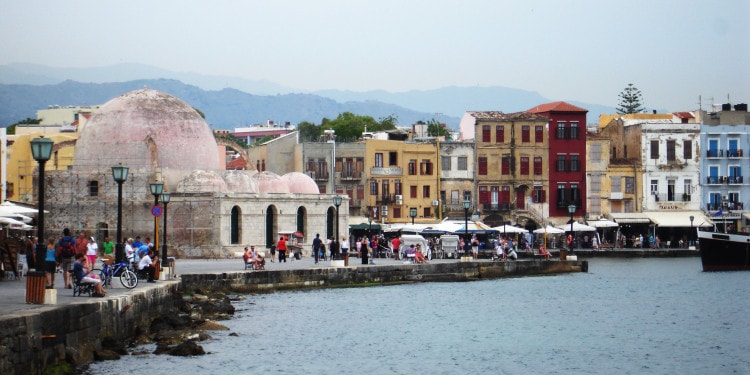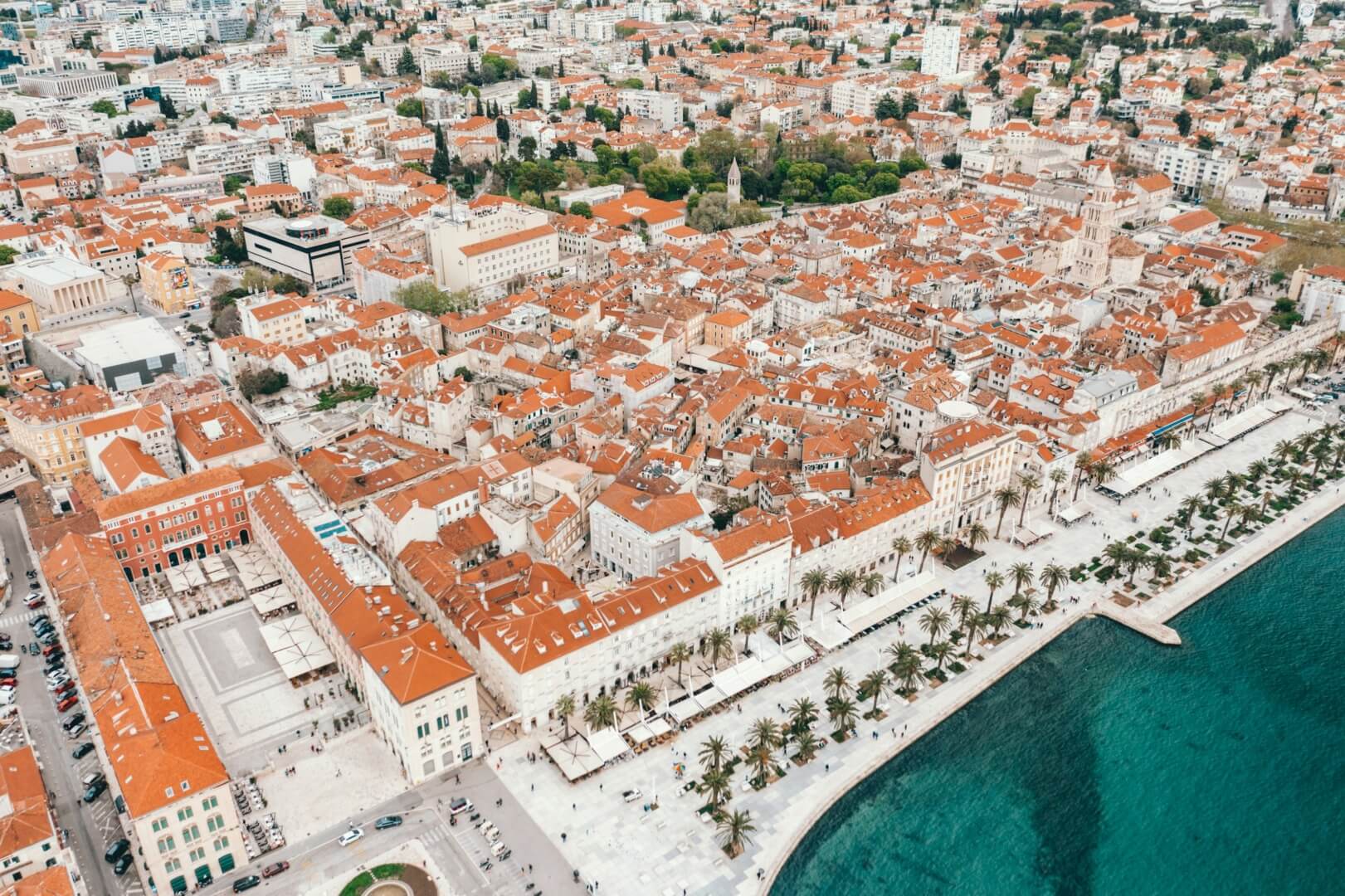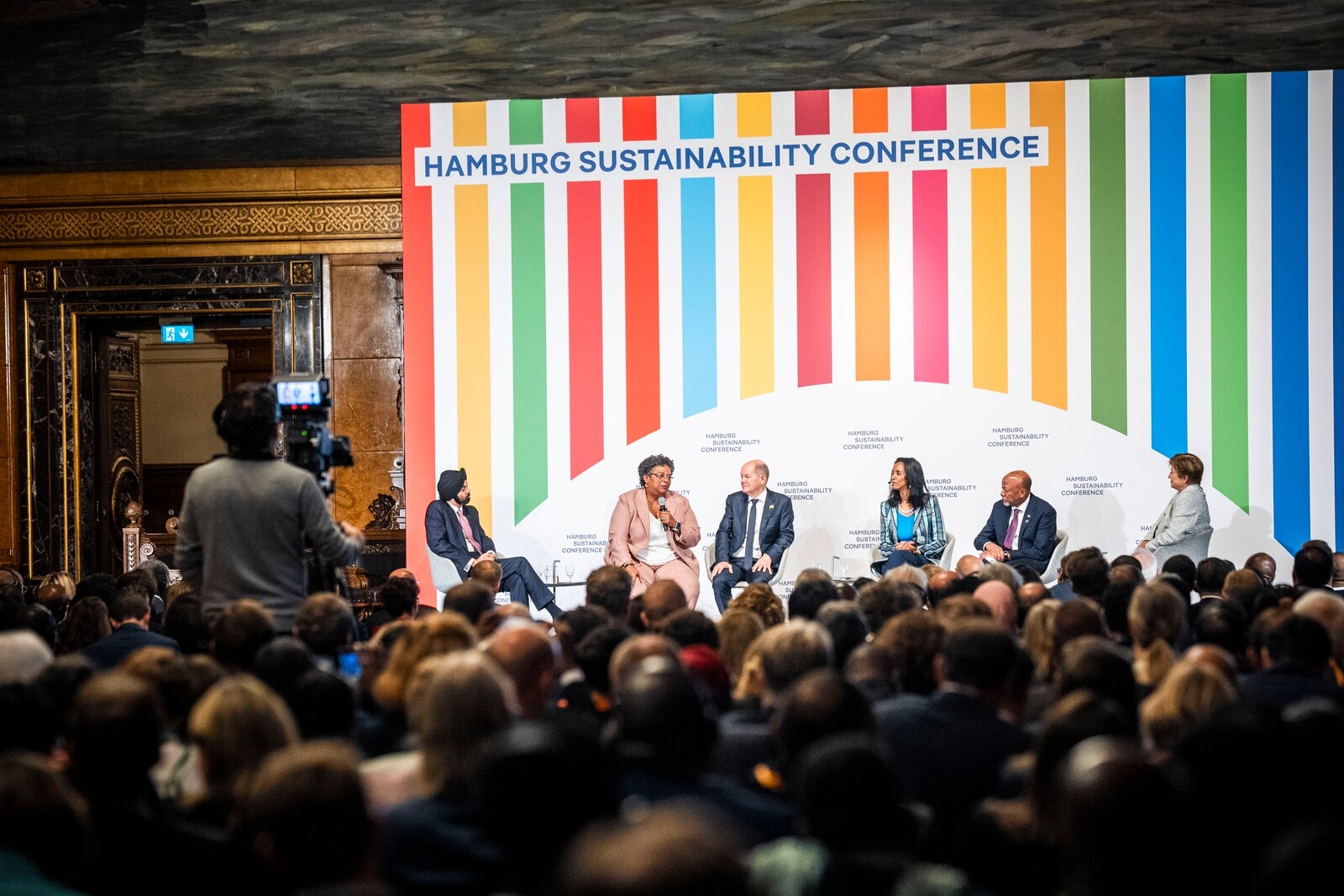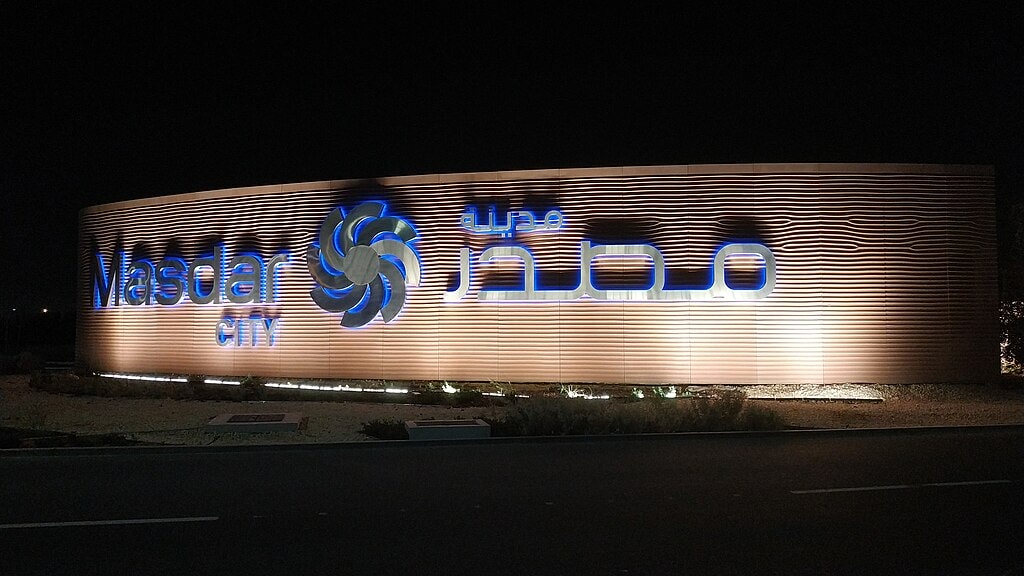In 2015, 193 countries signed the AGENDA 2030, a compendium of 17 goals for sustainable development. The Agenda 2030 also mentions tourism explicitly within goals 8 (Decent Work and Economic Growth), 12 (Responsible Consumption and Production) and 14 (Life Below Water).
At the ITB in March 2017, more than 30 organisations – representatives of non-governmental organizations, people’s movements and academia, among them Naturefriends International – presented the Berlin Declaration. They agreed that transforming our world was not possible without transforming tourism. This declaration was to encourage further reflection and debate, as well as demand concrete and immediate actions.
It was clear: we need to take a step towards fair tourism that keeps an eye on the well-being of people and the environment. However, a look at today’s tourism industry reveals a different picture: far too often, tourism development leads to exploitation, violation of human rights and destruction of the environment.
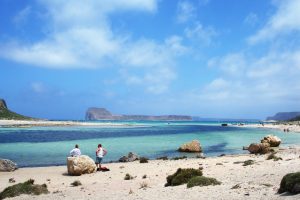
IN THE PHOTO: Crete, Greece. CREDIT: NFI/Cornelia Kuehhas
The achievement of a fair and just world and the full implementation of the 2030 Agenda will depend on political will, but also on the critical review and development of existing political structures and entrepreneurial practices, as well as the commitment of consumers, the media, educational institutions and the civil society.
Transforming Tourism is an online platform, created by NGOs from all over the world, who have been committed to sustainable tourism development for many years. It was established to bring together experts from different NGOs and scientific institutions to create a vision of sustainable tourism in the context of Agenda 2030. Below are summaries of a few articles, published on the platform:
Goal 1. No poverty: end poverty in all its forms everywhere.
Often economic growth is brought forward as a means of combating poverty. Tourism projects, especially, are often carried out without the participation of local population, profits are made at their expense and people are exploited. Only if the local community is involved in tourism development, and only if they benefit economically, tourism can contribute to poverty reduction.
Goal 2. Zero hunger: end hunger, achieve food security and improved nutrition and promote sustainable agriculture
“Think local” is the motto when it comes to the contribution of tourism to ending hunger in the world. This includes, for example, developing local food supplies that benefit regional agriculture, as well as avoiding food waste. An integrated, holistic approach to nutrition enables people who work in agriculture to feed themselves and their families while earning a sufficient income by selling their products to the hotel and catering industry.
IN THE PHOTO: Tourists skiing. CREDIT: NFI/Cornelia Kuehhas
Goal 3. Good health and well-being: ensure healthy lives and promote well-being for all at all ages
In order for the tourism industry to contribute to good health and the well-being of all people, the governments and the tourism industry have to make sure that jobs are in line with labour laws and safety standards, and that the employees earn enough to pay for health insurances and medical fees. It is essential that tourism revenues are invested in high-quality affordable healthcare systems that are available to both locals and guests.
Goal 4. Ensure inclusive and equitable quality education and promote lifelong learning opportunities for all
Governments, politicians, political decision-makers and international development agencies often underestimate the potential the tourism industry has on education. Providing training for the local community is especially vital when it comes to employing qualified staff for a sustainable development of the tourism industry.
Goal 5. Gender equality: achieve gender equality and empower all women and girls
Without gender equality, there can be no sustainable development. This also applies to tourism. Gender equality and empowerment of women must be a part of all tourism projects. This requires political willingness and a reassessment of priorities and indicators of economic, social and environmental development.
Goal 6. Clean water and sanitation: ensure availability and sustainable management of water and sanitation for all
Tourism contributes to the scarcity of water in many areas and thus to inequality – through the acquisition of public water supplies, overuse of groundwater reserves and water pollution. The consequences are increasingly frequent conflicts with the local population. In the interests of sustainable tourism, water resources must be handled with care and all people must have access to clean water and sanitation.

IN THE PHOTO: Janjanbureh, Gambia. CREDIT: Association Sénégalaise des Amis de la Nature (ASAN)
Goal 7. Affordable and clean energy: ensure access to affordable, reliable, sustainable and modern energy for all
Tourism is a very resource-intensive economic sector. The infrastructure – transport, accommodation, food, attractions, etc. – requires a lot of energy. At the same time, around 2.5 billion people worldwide do not have access to reliable energy supplies. Often, animal dung or firewood is used for cooking and heating. Deforestation leads to urban sprawl, desertification and, as a consequence, less land is available for people. Climate change is aggravating this problem. The tourism industry has to focus on energy efficiency and the use of renewable energy sources in order to minimize its environmental impact.
Goal 8. Decent Work and Economic Growth: promote sustained, inclusive and sustainable economic growth, full and productive employment and decent work for all
The creation of jobs, social protection, labour rights and social dialogue – these four pillars of the “Decent Work Agenda” of the International Labor Organization (ILO) are integral parts of the 2030 Agenda. The tourism industry creates jobs – but often with poor working conditions, insufficient pay and little involvement of the local population. Thus, it’s not just about the quantity, but also about the quality of jobs.
Goal 9. Industry, Innovation and Infrastructure: build resilient infrastructure, promote inclusive and sustainable industrialization and foster innovation
The infrastructure – such as roads, railways, accommodation, restaurants, attractions etc. – is an essential factor for the tourism potential of a region. The living standard of the local population also depends to some extent on this. However, the expansion of tourism infrastructure requires space and resources. The planning and construction of a sustainable tourist infrastructure is complex and it must always be viewed in the context of regional conditions and the needs of the population. Ultimately all parties – locals and tourists alike – must benefit and negative impacts on nature and the environment must be kept as low as possible.
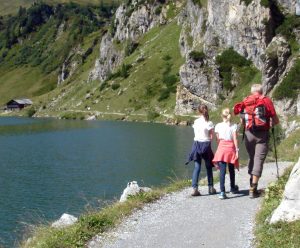
IN THE PHOTO: Tourists hiking. CREDIT: NFI/Cornelia Kuehhas
Goal 10. Reduced inequalities: reduce inequality within and among countries
In general, tourism growth is automatically equated with economic development and the reduction of inequalities. But the reality shows that the tourism system is reinforcing existing inequalities: workers are exploited, local communities are displaced, cultures are commercialized, natural resources are overused, and opportunities for future generations are at risk. Sustainable tourism is not an end in itself. Sustainability in tourism needs to be measured by the way tourism contributes to reducing inequalities.
Goal 11. Sustainable Cities and Communities: make cities and human settlements safe, resilient and sustainable
About half of the world’s population lives in metropolitan areas. Tourism can have a positive impact on cities, if, for example, tourism revenues are used to develop the urban infrastructure. However, cities are attractive travel destinations and run the risk of being overrun by tourists. We hear of more and more protests of locals against over tourism, also because decisions are often made without consulting the local community and it is not made possible for them to participate in the tourism planning and development of their home.
Goal 12. Responsible Production and Consumption: ensure sustainable consumption and production patterns
Tourism is a service sector and contributes to about 10 percent to the global gross domestic product. The establishment of sustainable consumption and production patterns is essential for the development of sustainable tourism. The 2030 Agenda calls for sustainable tourism that creates jobs and promotes local culture and products.
However, it is important to see beyond the classic criteria. Tourism should be measured by improving the quality of life and opening better development prospects for people in the destination countries.

IN THE PHOTO: Mallorca, Spain. CREDIT: NFI/Cornelia Kuehhas
Goal 13. Climate Action: take urgent action to combat climate change and its impacts
Tourism contributes to climate change, primarily through air travel. In 2015, the World Tourism Organisation counted 1.2 billion international arrivals, and the number is increasing. Air traffic contributes at least five percent to man-made global warming, although only two percent of the world’s population participate in it. Above all, it is the people in the countries of the global South who suffer the consequences, although they are least responsible for climate change themselves. Natural disasters are happening more often than ever, deserts and steppes are spreading, agricultural yields are falling, crop failures and food shortages are becoming a frequent occurrence.
At the same time, tourism itself is a victim of global warming. Climate change has an impact on the length and quality of the seasons, changes the nature of tourist habitats, and can lead to economic downturn, mass migration and political instability in travel destinations.
Goal 14. Life Below Water: conserve and sustainably use the oceans, seas and marine resources for sustainable development
Oceans cover 71 percent of the Earth’s surface. 183 countries have access to the sea and 37 percent of the world’s population lives on coasts. Сoasts are popular destinations, with 80 percent of tourism taking place in coastal areas. Tourism not only influences the ecology of coasts and seas – through pollution, obstruction, overuse of resources, etc. – but also has social, cultural, economic and environmental impacts on towns and cities and their populations.
Goal 15. Life on Land: protect, restore and promote sustainable use of terrestrial ecosystems, sustainably manage forests, combat desertification, and halt and reverse land degradation and halt biodiversity loss
Beautiful landscapes and a diverse fauna and flora are often important motives for choosing a destination. The tourists are looking for relaxation, peace, but also for experiences in nature. At the same time, tourism often has a negative impact on nature. For example, the construction of tourist infrastructure often destroys animal habitats, and uncontrolled growth of visitors damages local flora and fauna. Loss of biodiversity often leads to the landscape losing its attractiveness. Only joint efforts of politicians, the tourism industry and civil society can ensure ecologically, economically and socially sustainable development, especially in rural areas.
Goal 16. Promote peaceful and inclusive societies for sustainable development, provide access to justice for all and build effective, accountable and inclusive institutions at all levels
In the tourism industry, human rights are repeatedly violated and civil society is not being heard. Human rights and self-determination of communities must be at the core of any tourism development. It is important to establish effective and transparent monitoring mechanisms at a local, national and global level in order to measure the impact of tourism on the social and economic development. Individual companies must take responsibility for the impact of their activities and, if necessary, be held accountable.
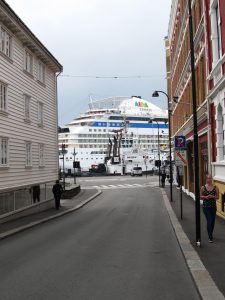
IN THE PHOTO: Stavanger, Norway. CREDIT: Astrid Plank.
Goal 17.Partnerships for the Goals: strengthen the means of implementation and revitalise the global partnership for sustainable development
Achieving the objectives of the 2030 Agenda requires a revitalized and expanded global partnership that brings together governments, civil society, business, the United Nations and other stakeholders, mobilizing all available resources. Effective support for developing countries – which also means increasing financial investment – is crucial to ensure equitable and fair progress for all.
Naturefriends International (NFI) is the international umbrella organisation of the Naturefriends movement, uniting approximately 45 member organisations and approximately 350,000 members. The focus of NFI’s work is on creating and implementing sustainable development of the environment and society. NFI is a member of the “Green 10”, a coalition of ten leading environmental NGOs active at the EU level.


